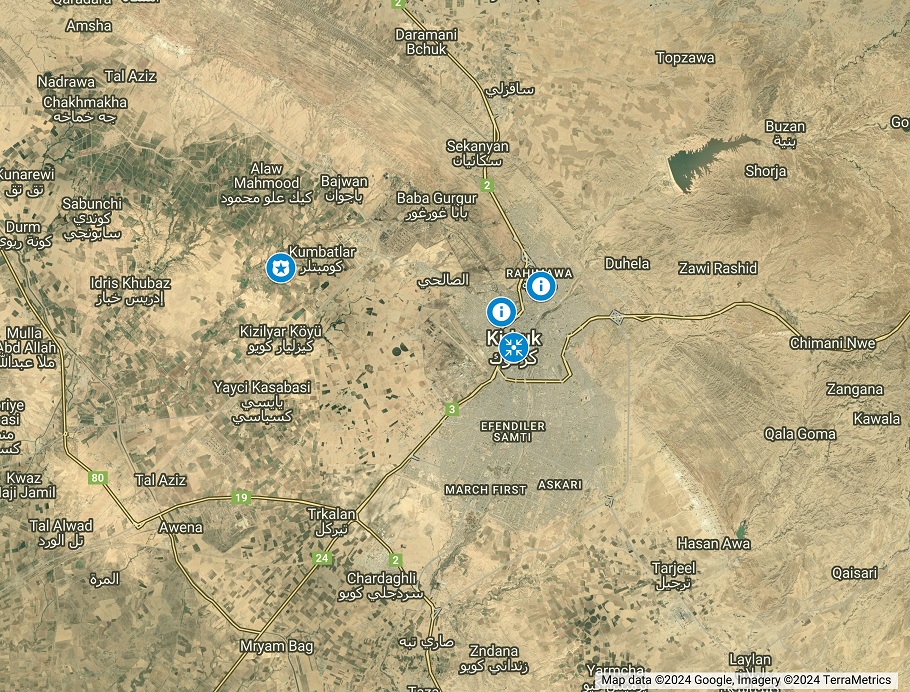1.1K
A biweekly brief of events and news occurred in the disputed territories.
Kirkuk
- The Prime Minister’s scheduled meeting with the winners of Kirkuk’s provincial council blocs on March 18 was postponed to an unknown date. The cancellation occurred due to the failure of Arab, Turkmen, and Kurdish parties to reach agreements regarding the formation of the local administration. Previous meetings with Prime Minister Mohammed Shia al Sudani discussed the formation of the administration, with the third meeting intended to announce consensus. However, the parties remain far from agreements, with ultra-nationalist Turkmen politician Arshad Salahi acknowledging interference from Iran and Turkey in Kirkuk’s government formation. Salahi also mentioned the possibility of annulling the election results via the constitutional court if parties fail to reach an agreement. Furthermore, on March 19, Sunni leader Khamis Khanjir announced from Kirkuk that the formation of the administration is imminent. However, divisions persist within the Sunni Arab winners, as acting governor Rakan al Jabouri did not participate in Khanjir’s meeting in Kirkuk. Similarly, divisions exist among the Kurds between the Kurdistan Democratic Party (KDP) and the Patriotic Union of Kurdistan (PUK) over the post of the governor, despite suggestions from Turkey and Baghdad for Kurds to agree on rotational governance among Arabs and Kurds for the governor’s post. Meanwhile, Iranian-backed politician Mohammed al Baiati, leader of the Badr Organization, stated that the parties of Kirkuk have authorized Prime Minister al Sudani to designate a minister from his cabinet to run the province until consensus is reached. Disagreements among the parties have led some of the Sunni Arabs to advocate for keeping the current acting governor, al Jabouri, in office. Since October 16, 2017, Kurds have been marginalized in the province, with Baghdad dismissing its Kurdish governor and removing hundreds of Kurdish officials from their posts following the independent referendum held by Kurds.
- According to a report by Iraq Today, the Iraqi Oil Ministry has completed the renovation of the Kirkuk-Turkey pipeline, which traverses Saladin and Nineveh provinces. The pipeline suffered damage from Da’esh terrorists in 2014, rendering it inoperative. The report cites an Iraqi official stating that the pipeline is now operational for exporting Kirkuk’s oil directly to the Ceyhan port in Turkey, bypassing Kurdistan’s pipeline, which Baghdad had utilized since 2014 until Kurdish oil exports were halted. The Kirkuk field can export up to 350,000 oil barrels daily. Concurrently, after a decade, Kirkuk’s oil is once again being transported to the Daura refinery in Baghdad, following repairs to the pipeline damaged during the emergence of the Da’esh ‘caliphate.’
- In Kirkuk, the police arrested a Kurdish man for displaying a picture of Abdullah Ocalan on his vehicle. This action coincides with Iraq’s National Security Council’s prohibition of Kurdistan Workers’ Party (PKK) activities in Iraq, following an agreement with Turkey. Media reports and statements from Turkish officials suggest a potential Turkish military operation within Iraqi Kurdistan against the PKK, following multiple visits by Turkish officials to Baghdad and the agreements reached therein.
- On March 18, security forces arrested a group of ISIS (Da’esh) terrorists known as the “al Qadisiya division,” comprising eleven individuals, nine of whom admitted to being members of the group. Additionally, two members confessed to being part of Da’esh’s Nineveh branch. Separately, the government has decided not to hand over the security file of Kirkuk province to the local police.
Shingal (Sinjar)
- On March 28, displaced Yazidis in Zakho staged protests against the meager compensation allocated by the Iraqi government for each family, which is insufficient to support their return to their homes in Shingal. Shingal continues to face significant security, political, and service-related challenges. Recently, the Ministry of Displacement and Migration announced plans to close all displaced camps in the Kurdistan Region, compelling residents to return to their respective areas and providing only $2,600 in compensation. Tens of thousands of Yazidis and Sunni Arabs sought refuge in Kurdistan following Da’esh attacks in 2014. Naif Saido, the mayor of Shingal, expressed skepticism about the feasibility of displaced people returning, citing the inadequacy of compensation relative to the district’s devastation. These developments coincide with efforts by the Nineveh Provincial Council to elect a new mayor for Shingal.

